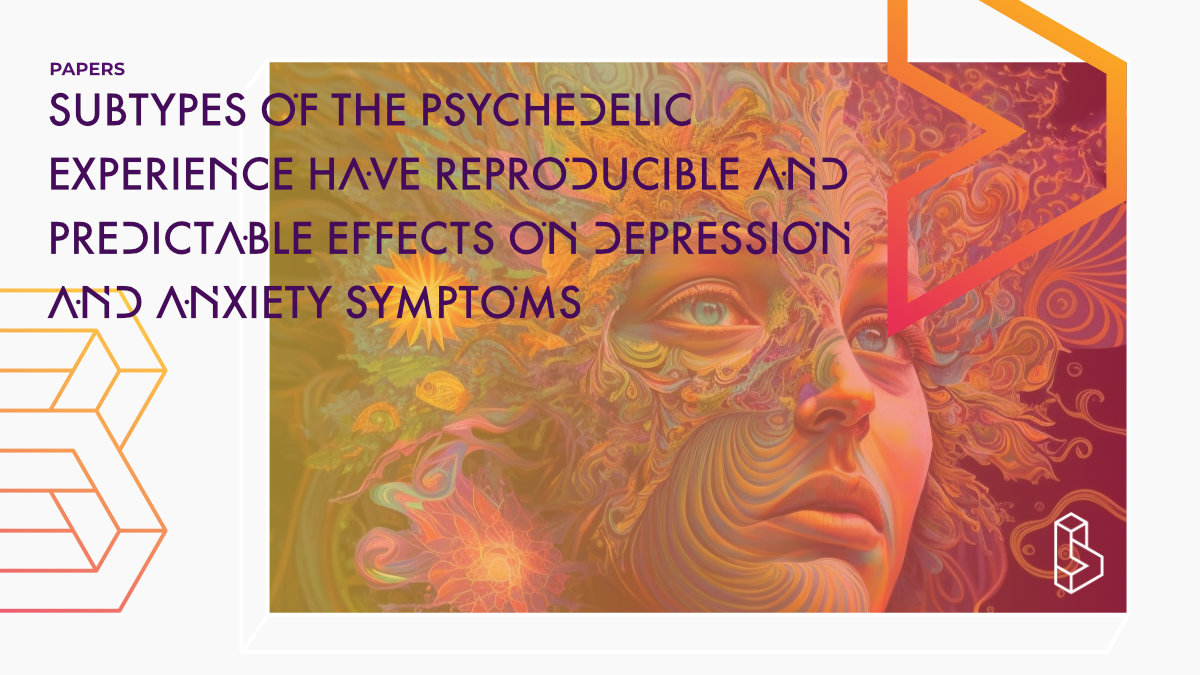This re-analysis of survey data (n=985) finds three different clusters (subtypes) of the psychedelic experience. The subtypes, found with machine learning, were associated with reduced anxiety and depression symptoms and other markers of psychological well-being. The subtypes were also highly reproducible across multiple psychedelic substances.
Abstract
“Background: Subjective experiences seem to play an important role in the enduring effects of psychedelic experiences. Although the importance of the subjective experience on the impact of psychedelics is frequently discussed, a more detailed understanding of the subtypes of psychedelic experiences and their associated impacts on mental health has not been well documented.
Methods: In the current study, machine learning cluster analysis was used to derive three subtypes of psychedelic experience in a large (n = 985) cross sectional sample.
Results: These subtypes are not only associated with reductions in anxiety and depression symptoms and other markers of psychological wellbeing, but the structure of these subtypes and their subsequent impact on mental health are highly reproducible across multiple psychedelic substances.
Limitations: Data were obtained via retrospective self-report, which does not allow for definitive conclusions about the direction of causation between baseline characteristics of respondents, qualities of subjective experience, and outcomes.
Conclusions: The present analysis suggests that psychedelic experiences, in particular those that are associated with enduring improvements in mental health, may be characterized by reproducible and predictable subtypes of the subjective psychedelic effects. These subtypes appear to be significantly different with respect to the baseline demographic characteristics, baseline measures of mental health, and drug type and dose. These findings also suggest that efforts to increase psychedelic associated personal and mystical insight experiences may be key to maximizing beneficial impact of clinical approaches using this treatment in their patients.”
Authors: Aki lance, Rafael Lancelotta, Natalie Gukasyan, Roland R. Griffiths, Frederick S. Barrett & Alan K. Davis
Summary of Subtypes of the psychedelic experience
Depression and anxiety disorders affect more than 300 million people worldwide and present a significant public health burden. However, current treatments have limited efficacy.
Research exploring alternative approaches for treating mental illness has expanded in recent years. Psilocybin-assisted therapy for major depressive disorder has shown significant reductions in depression and anxiety symptoms, with 57% of participants in remission at one month and 58% at 12 months.
Research into the effects of psychedelic drugs on mental health conditions has been conducted on naturalistic populations via online survey studies. These studies have found that psychedelic use may lead to reductions in psychological distress and suicidality, improvements in depression and anxiety, and reductions in alcohol consumption and misuse.
Study details
Participants
985
Humans
Authors
Authors associated with this publication with profiles on Blossom
Rafaelle LancelottaRafaelle Lancelotta, MS, LPC (they/she) is a white Latine (Cuban) transgender Nationally Certified Counselor and a PhD student at The Ohio State University College of Social Work researching the role of human relationship in psychedelic-assisted therapy.
Natalie Gukasyan
Dr. Natalie Gukasyan is a psychiatrist and post-doctoral research fellow at Johns Hopkins University.
Roland Griffiths
Roland R. Griffiths is one of the strongest voices in psychedelics research. With over 400 journal articles under his belt and as one of the first researchers in the psychedelics renaissance, he has been a vital part of the research community.
Frederick Barrett
Frederick Streeter Barrett is an Assistant Professor of Psychiatry and Behavioral Sciences and works at the Johns Hopkins University Center for Psychedelic and Consciousness Research.
Alan Davis
Alan Kooi Davis is an Assistant Professor of Social Work at The Ohio State University and Adjunct Assistant Professor in the Center for Psychedelic and Consciousness Research at Johns Hopkins University.
Linked Research Papers
Notable research papers that build on or are influenced by this paper
Psychological flexibility mediates the relations between acute psychedelic effects and subjective decreases in depression and anxietyThis survey study (n=985) finds that psychological flexibility fully mediated the effects of mystical/peak experiences on depression/anxiety.

